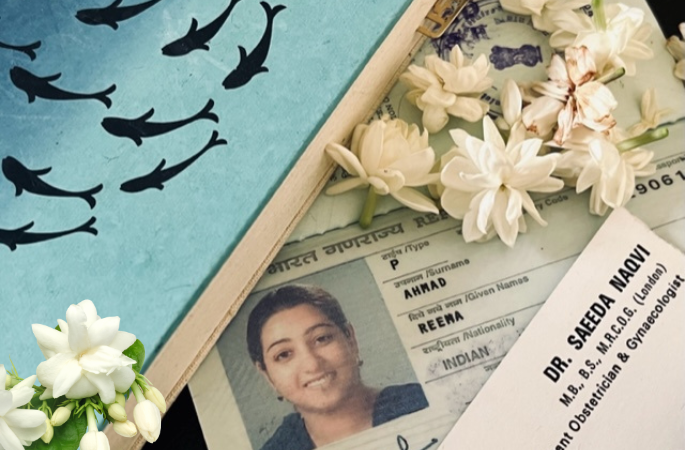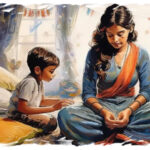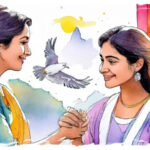What is the story of a name- any name?
I lie thinking about this, half asleep in my sick mother’s bed. This is where most ideas turn to visions and then thoughts in my drugged brain these days. What I see first is a nameplate.
Tahir
Alia
Mutahir
Faraz
Four names etched on a square slab of black granite on the gatepost of my (now ex) Aligarh home. The first time I had seen that slab knowing that I would be a part of that family, I had thought to myself, “My name will be added here soon.”It never was. Not after I came to live in that house two years after my marriage and not when I left that home forever eight years later.
A house I spent most of my time scrubbing, swabbing, dusting, polishing, cleaning grime stuck inside toilet seats, wiping grease off kitchen tiles, clearing cupboards that reeked of dead people, their sweat and used clothing- that house could never muster enough sparkle to add my name to that list. All the Harpic in the world couldn’t clear a space for me.
Maybe my name didn’t matter because I was a woman. But the second name on that slab had been a woman’s name. In all the years I was married, I measured my housekeeper efficiency and hostess charm against the name of her ghost. I always fell short.
What I see next is a hazy scene from the first few weeks of my arrival in that house. “Aapke ration card pe Reema Ahmad likha hai. Aap apna naam nahi badlengi?” Abbajaan , my son’s grandfather, had asked me. A gentle man, he had told me not to bother about covering my head or wear glass bangles unless I wanted to. He had also casually said this over chai one day, “Ek aurat ki jagah uske bachchon ke paas hoti hai. Mehnat se baap kamae, pyar se ma bachchon ko khilae.” I had nodded my head silently. I was only twenty one.
I had also said nothing when he had expressed disapproval about hiring a nanny for my six month old baby. At 25, I had wanted to study some more. “Hamare yahan bachchon ko naukar nahi paalte”, he had said. I spent the next five years trying to prove that I could raise a baby like no one else could. With no husband to help me, Abbajan had become my companion. We would spend mornings and evenings out on the verandah, sipping chai quietly, baby Imaad bouncing on his knee. Sometimes I’d read as he watered the plants, Imaad tottering behind him with his yellow plastic watering pot.
Abbajaan drove me to the doctor for every inoculation appointment and stayed up with me at night, helping to care for a howling baby. One night he told me to sleep on the bed as he took a bawling, feverish Imaad from my limp arms and sat down on a chair. I was too exhausted to feel awkward. Another time, Abbajan did not comment on the horrible food his young daughter in law made for a dinner organized for his friends. The pasanda gravy tasted like sawdust and the paalak chicken was bitter. He had smiled and said, “Bohut achcha bana hai.” I tasted it later and spat it out. One time Imaad’s father scolded me in front of everyone for wanting to go home to my sick mother, twice in a month. Abbajan had admonished him loudly and said, “Her parents are her responsibility. No one can stop her if she wants to visit. Uske pehredaar mat bano.”
In the ten years I called him Abbajan, he never once called me anything other than ‘Aap’. But Abbajan had also asked me, “Aap apna naam nahi badlengi?”
The third thing I see is my passport. Reema Ahmad. My father had applied to renew my passport after my marriage. When I was arranging papers to apply for my son’s passport some time after my separation, Daddy had said to me, “I knew this would happen. This is why I didn’t ask you to change your name after your wedding. It would have been so difficult to change it back to Ahmad.”
Had it ever been easy though-to make that transition from being a daughter to a wife to a non person who was a mother? It wasn’t even easy to get a passport for my young son because his name did not match mine, because our passport application did not have his father’s name or signature. It didn’t matter if the government decreed single mothers abandoned by their spouses, not cared for or loved by them, their children not provided for by their fathers, had every right to take their children wherever they wanted. It did not matter that they alone stood for hours in snaking lines, suffering hot, probing questions from grubby uncles about why they didn’t live with their husbands as their sleepy children looked on. It didn’t even matter that these mothers had cut or torn themselves open birthing their children. What mattered was a missing person, a missing name, a missing life that was supposed to be there because my son carried his name.
The fourth thing I see is a twelve year old me asking my mother this question, “Ammi, why didn’t you change your name when you married Daddy?”“My name is the only thing that is mine, Sara”, my mother had responded. “Everything else, we have to beg for. Our name belongs only to us.”
I want to go back in time and tell my mother that our names don’t belong to us. They belong to our fathers. Naqvi, her father’s name. Ahmad, my father’s name. Their names. Where have our names gone? Where have they been hiding? I want to tell my mother that our names our missing. Stored in safe boxes by our husbands and fathers or mucked about in mind-brothels by men who dislike the nakedness of unnamed women, our names are invisible. Locked in the strongholds of wills and property, owned by some and dismissed by others, our names are in exile. Sometimes our runaway names make homes on grave stones. Often these gravestones say ‘Beloved wife, mother, daughter…’
When I die, I don’t want a gravestone to mark my missing name.
Maryam Khatoon, my daadi’s name. Mutaqqui Begum, my naani’s name. Woman. That was the meaning of their surname- the name that defines who you are, where you come from, and what blood runs in your veins. If I had a daughter, I would have wanted her to have two first names that belonged only to her. Perhaps I would have named her Savvy Soumya after my friend. Free of all surnames.
The fifth thing I see is an email from a dear mentor, Shubho. ‘Reema, the first thing you should do is creating a website in your name. Not your organization, not what you do, but your name. That way it will keep options open while creating a distinct identity.’ This was way back in 2017. That website doesn’t exist yet. “Haw mere naam pe website? Maine aisa kya kiya hai? Do I deserve to have a website in my name? I have done nothing to prove my name.” As if a name was a theorem waiting to be proven.
I turn over and wipe the salt spilling from my eyes. I squeeze them shut and force myself to see my name. It arises like squiggly phosphene floaters in a bold blue font on the cover of a yellow book. Reema Ahmad – two neat little words that pop up on YouTube and Google. I chuckle when I think about my young cousin telling me once, “Appi do know you are Googleable?” No, I didn’t know I was Googleable. Not that it matters much. What matters are my other names.
Sara- My other name gifted by my brother because he did not like Reema. It means noble lady. I will spend the rest of my ladyhood trying to prove just how ignoble I can be. But oh! the softness of ‘Sara’ on my parents’ tongues, the slight tremble of its music on my siblings’ lips.
Amma–The stormy rumble and cry of this name. The way it is sometimes a wail and at other times a cry for help and yet another time a soft pillow for my son to dream on. This name.
Jaan– The name that my lover calls me by. He suffixes it with ‘Oos’ and ‘Aas’ when it pleases him. Holding my name in a gentle kiss or a wet lick, it goes through many rebirths as it reaches my ears from his lips. That name.
Meera– The name I playfully gave myself a few years ago because it reminded me of a blissful mad woman who wasn’t afraid of insanity. Who still sings and dances in abandon a thousand years after her death, leaping out in laughter and weeping from the yellowing pages of books. That is how I want to be remembered- a little mad and very loving, Meera.
And then, there’s just Reema– A name that means innocent beautiful eyed gazelle in Arabic, a limitless being in Sanskrit and the goddess Durga in old Bangla. The person Reema, who is a friend and also a therapist. Reema who is someone people love talking to and whose voice has comfort and warmth to offer. Reema, who is incorrigibly badmaash and always sick or tired, but never too tired for babies or animals or sex. Reema, who exists beyond and between the Ahmad that suffixes it. Reema, who is this name and many names and no names at all.
What is the story of a name anyway? In another life, I will rewrite this story and give us all weird names. *Natkhat Neeru, Romanchak Raju, Kateela Karthik, Sexy Soumya, Roshan Roshni, Dreamy Deepika, Manpasand Manisha, Fearless Farah, Surili Sharmada, Sunshine Sanskriti, Sublime Supriya, Fluid Farzana, Aham Anam, Pyari Parvathy, Shiny Shanno Sanobar, Soulful Sumira, Angaar Anusha, Powerpuff Prerna, Spyglass Shivam, Nakhrili Naazuk Nidhi, Kadakti Komal Khushboo and Tender Tendril Tanya. What is the story of these names?
They are what remain when I wipe off the dusty nameplate to my heart, my home. You cannot see or touch this nameplate. You can only feel it. Like the quiver in my belly when I am excited and the shiver down my spine when I am cold. Like the lump in my throat as I write this, and the beginning of my gurgling, cackling laugh that gushes like a roaring mountain river and twinkles like an ancient forest fire, forever warm and safe. My many names, with these other names, are **’Immortal for a moment.’
*These are the names of my friends from the Ochre Sky Writing Circle. I have playfully renamed them.
**This is the title of a beloved book, Immortal for a Moment by Natasha Badhwar (Simon and Schuster, 2018)
This essay was written in response to the prompt ‘ Tell me the story of a name’ by Deepika Khatri, a fellow writer in the Ochre Sky Writing Circles in the Ochre Sky Memoir writing workshop facilitated by Natasha Badhwar and Raju Tai.




